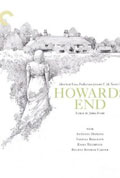
Directed by
James Ivory
140 minutes
Rated PG
Reviewed by
Bernard Hemingway


Howards End
It is little surprise that this exquisite Merchant-Ivory adaptation of E.M.Forster's 1910 novel of the same name won an Oscar for art direction and set decoration. It is a joy for lovers of Edwardiana and English rusticity. The team which included screenwriter Ruth Prawer Jhabvala had previously filmed Forster's Room With A View (1986), that had made a star of Helena Bonham Carter, who has a smaller role here, and Maurice (1985), also do a fine job of realizing the drama of Forster’s account of the changing times that will be soon swept away altogether by the Great War.
Howards End is the name of a property owned by the ailing Mrs. Wilcox (Vanessa Redgrave) who on her deathbed leaves it to an independently-minded spinster acquaintance, Margaret Schlegel (Emma Thompson). The Wilcoxes, who belong to the wealthy upper-class are horrified at the prospects of losing one of their assets and so expunge all trace of Mrs Wilcox's wishes. The husband, Henry, (Anthony Hopkins), however, can’t quite reconcile himself to the deceit and in his sympathy for the duped young woman, ends up marrying her, ultimately driving a wedge between the old privileged propertied class to which he belongs and the new more humanistic, or as he calls them, “utopian”, values of the 20th century.
Both as a production and drama the film impresses with Tony Pierce-Roberts’ cinematography superb and Emma Thompson who won a Best Actress Oscar topping a first class cast. Hopkins, who was not nominated is excellent as the smug paterfamilias and Samuel West gives an engaging performance as Leonard Bast, the Schlegel sisters' hapless "protégé" whilst James Wilby is very effective as the public school dork, Charles.
Although the film is remarkably faithful to Forster's text the admittedly elliptical resolution seems to suggest that Margaret has sacrificed her suffragette-inspired independence and capitulated to her hypocritical husband but offers no explanation why this would be so. This seems perverse particularly as in the original text Henry is broken by the tragedy that befalls Charles his loss of nerve effectively leaving Margaret in command (he breaks into tears and tells her "I don't know what to do" in both versions). This is important because Howards End originally belonged to the first Mrs Wilcox and only came to Henry because at the time under English all property passed to the husband upon marriage. Hence Henry refuses to let Helen sleep overnight at Howards End because it would not respect "the rights of property" as he puts it to Charles. Foster strikes another blow for women by having Margaret promising to bequeath the property to Helen's illegitimate child, thus ensuring the property will pass forever out of the Wilcox line.
As I can't believe that Jhabvala would have changed the ending so radically for either artistic or political reasons I assume something got lost in Ivory's directing. Either that or I'm missing something.
Want something different?





